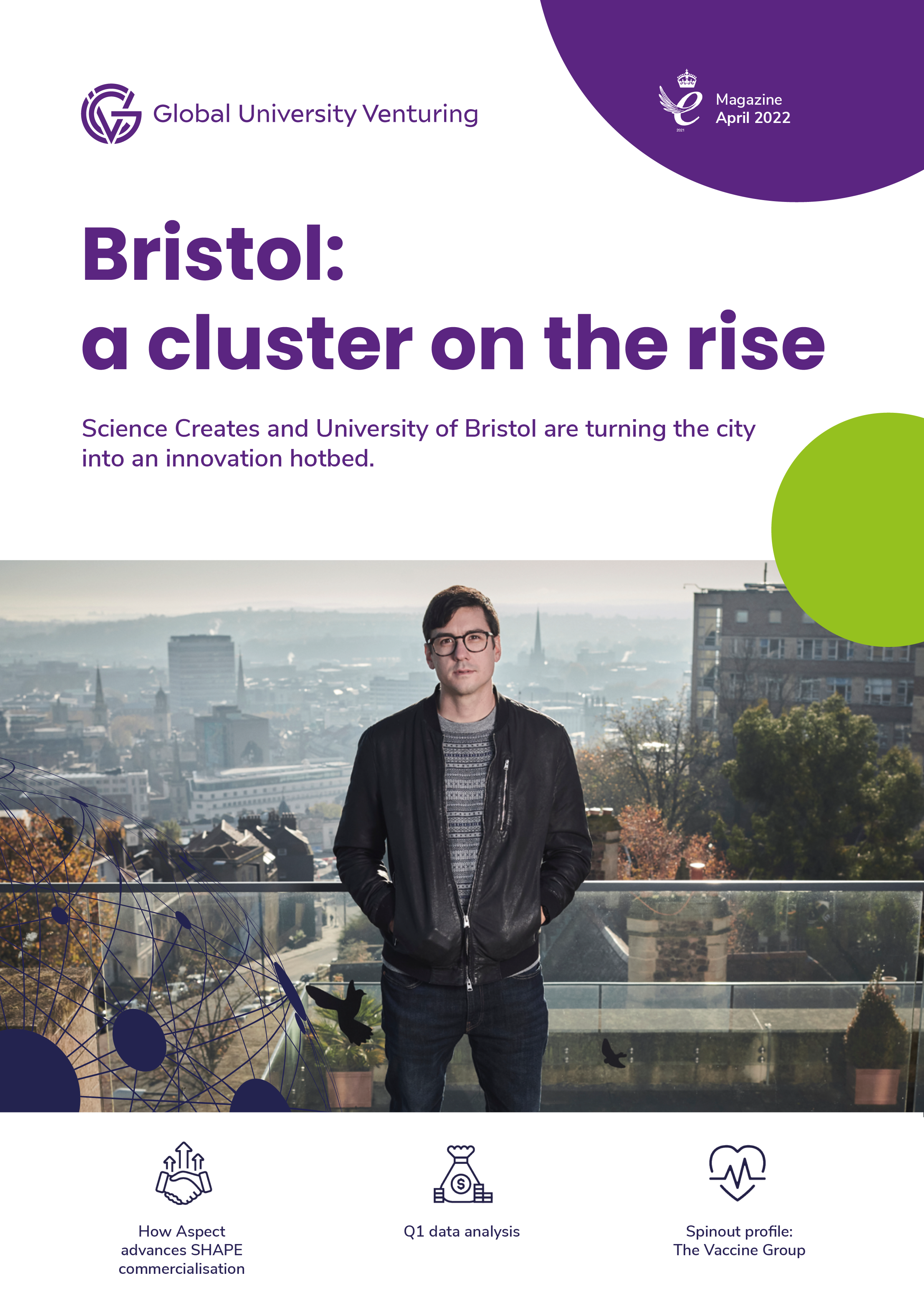Science Creates and University of Bristol are turning the city into an innovation hotbed.
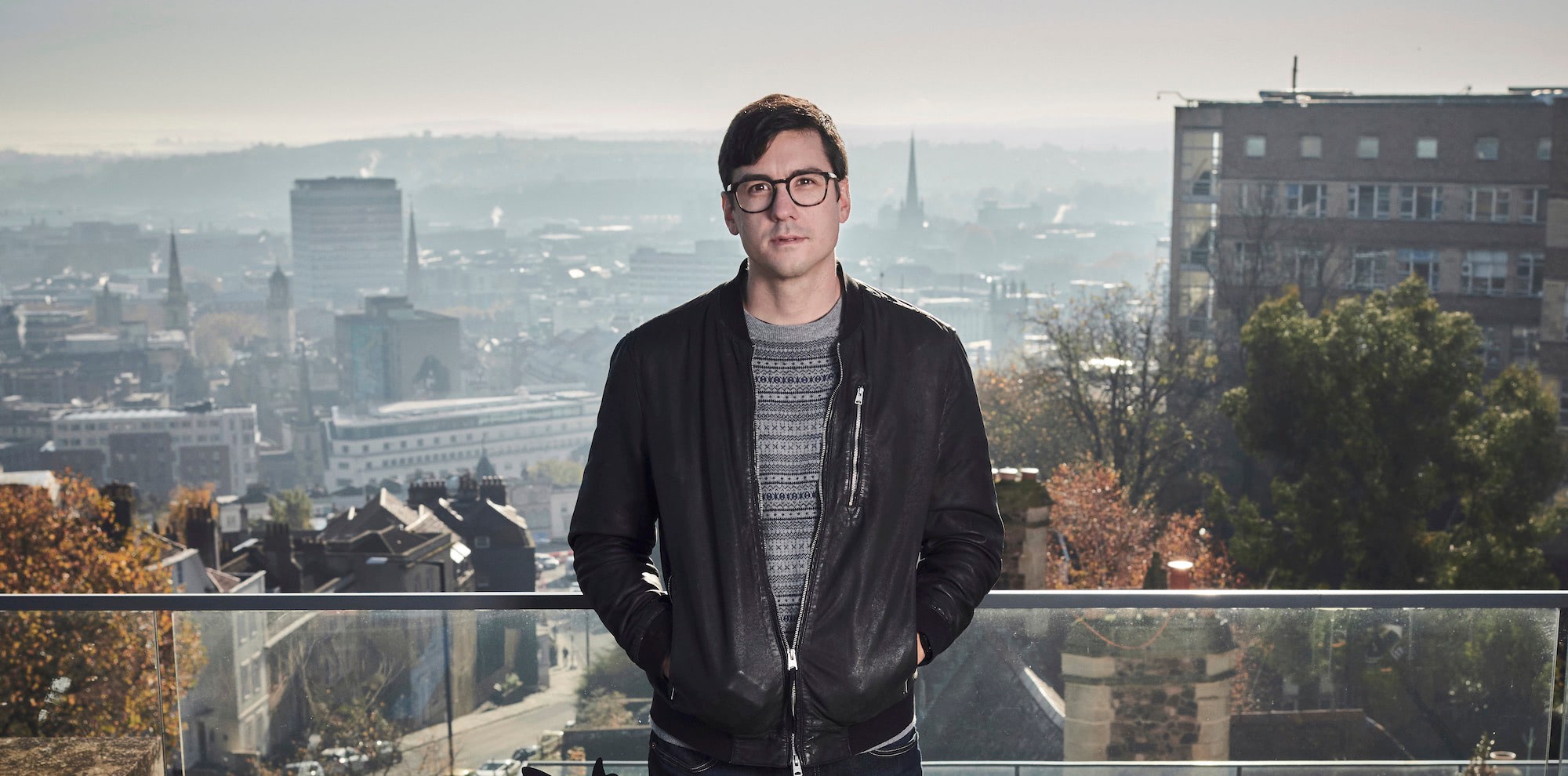
Harry Destecroix
Years before Harry Destecroix would sell his University of Bristol spinout Ziylo to pharmaceutical firm Novo in a deal worth up to £623m ($820m), the entrepreneur was facing down a screaming landlord and several police vans trying to kick the company out of its offices on a Friday night. It was not the first time Ziylo was losing its headquarters.
“It felt like nobody wanted us to exist,” Destecroix told Global University Venturing.
Having initially worked out of the basement flat he shared with co-founder Tom Smart, the pair moved Ziylo into a building occupied by a design agency that had no use for one of the floors. Destecroix put in a computer network, the team laid new floors and had desks made by the same designer who would later create the furniture for Science Creates, the incubator launched by Destecroix.
Six months in, the design agency’s managing director informed Destecroix that they had sold the lease to a developer and Ziylo had to move out. And so, the team moved across the street into a former BBC building.
“It was about 1,000 square feet but it looked like someone had just ripped everything out,” Destecroix remembered. They rebuilt the space, partitioned it off into one part for Ziylo and one for the incubator’s development team. They put in a board room. Then one day, they received an email asking “a lot of odd questions” that made it clear the landlord wanted them out.
“About a week later I received a phone call saying the bailiffs are in and had locked us out. They told us we were being evicted for breach of tenancy. But luckily, we had an experienced chairman, Keith MacDonald, and I do not think they realised that these kids with skateboards would have a whole team of lawyers emailing them,” Destecroix said.
“This guy was furious. He had bought this building and he wanted to do whatever he wanted with it,” he continued. Ultimately, Destecroix’s lawyers warned, the new landlord would serve the correct notice and force them out, so the law firm produced paperwork to get Ziylo’s team into the building and, using two hired vans, the team emptied the office.
“At 6pm, the landlord shows up and he starts screaming and shouting, and then calls the police. Suddenly five police vans show up at the office on a Friday night in Bristol. It was hilarious,” Destecroix recalled. The police inspected Destecroix’s paperwork and, content everything was in order, went away.
After they had cleared the building, Destecroix offered a cup of tea to the landlord. Having calmed down, the landlord acknowledged that “what you are doing is really interesting”, Destecroix remembered.
The entire ordeal could have been prevented with a civilised conversation, Destecroix said. “Out of all the things that try to kill you as a startup, there were so many unnecessary things,” he explained. Although the idea of opening an incubator already existed by Ziylo’s second eviction, the incident reinforced the realisation that such a space was desperately needed.
“That is what these buildings can protect from. People can focus on the science and development, not getting evicted. The big wide world is just not meant for a non-revenue generating innovative startup. A lot of people in the normal commercial world do not understand it,” Destecroix reflected.
Destecroix – quick to point out everything was a team effort – had nevertheless embraced being the face of it all. “As with all stories it is good to have a central character to carry the message. It is humanising,” he pondered.
Science Creates’ journey began in earnest in 2017, when a first incubator, dubbed Unit DX, opened in Bristol’s St Philips neighbourhood. A second location in Old Market followed in November 2021 and, in early April 2022, Destecroix handed over the leadership of the incubators to Ashley Brewer. Destecroix moved his focus onto Science Creates Ventures, the venture capital arm of the Science Creates brand.
“We cater for that fast-growing deep tech company that needs access to high-quality research facilities,” Destecroix described the incubators’ mission. “They want to be in one of the greatest cities in the UK to live in, Bristol, and that has benefits of attracting talent, which is in high demand at the moment, of course.”
Science Creates charged rent at a rate that was “reasonable for pre-revenue startups” but it took no equity. The incubators gave outsiders, be that government or investors, a focal point within the city, Destecroix argued.
Visitors to the Old Market location are greeted by an atrium-like, sunlight-flooded space complete with comfortable seating options, a kitchen area and meeting rooms that embrace geekiness in their names. Destecroix chose one called Magnesium for the interview with Global University Venturing.
“We raised a lot of debt to build the facility, so much of the rent we charge pays off that. It is a very narrow margin business, but we do it because of the wider economic benefit, which is centred around this realisation that depending on where research is done has a huge bearing on whether it is commercialised,” he explained. “The world needs a lot of ideas – the pandemic highlighted we were not ready for it. It is going to be a huge challenge to meet net zero and 75% of diseases have no cure.”
Science Creates had no interest in catering for the type of entrepreneur that came out of a business school and wanted to copy an existing idea into Bristol, he stressed. “There are very few people who innovate, not many companies that move the needle. We are looking at: how do we take a fundamental breakthrough and use it to create a new product or service that was not possible before? How does that affect the world?”
These huge differences were one thing that a lot of people within business support did not appreciate, he added.
This need to innovate had always been Destecroix’s view of the world. Growing up in a family of medical professionals, he was “always fascinated by doctors and surgeons who are able to save people’s lives”, he noted.
“I was very much a problem child in the sense that I took things apart, diffused the house, reset the breakers… I could not be left alone because there would probably be a risk of fire,” he quipped. This drive to understand how the world around him worked led him into a career in biotech where he stepped into a “very fortunate chain of events” that meant he was doing his PhD at the pinnacle of 20 years of research from Prof Anthony Davis into making artificial glucose binders – the technology later licensed to Ziylo.
“I have had this real privileged journey where I spun out into an ecosystem that was very early and underdeveloped for its external support. I had the unique opportunity to run experiments, to try and improve things for others who followed,” he said.
“Out of all the things that try to kill you as a startup, there were so many unnecessary things. That is what these buildings can protect from. People can focus on the science and development, not getting evicted. The big wide world is just not meant for a non-revenue generating innovative startup. A lot of people in the normal commercial world do not understand it.”
Harry Destecroix
“To have our own safe spaces is really important,” he stressed. “That led to the first incubator, which was about trying to square that circle. I needed space for my own company and I had met all these other academics with ideas and wanted to spin out companies – people like Adam Perriman and CytoSeek.”
Ziylo had a “great chairman” who let Destecroix pursue the incubator while remaining chief executive. “I saw these things as a vehicle to do Ziylo because we were solving a big problem for us.”
Unit DX filled up within two years and “it was clear that that was the problem,” Destecroix said. “It was a classic chicken and egg problem, because local government had for years debated on whether to build labs on the science park. It is obviously very hard to see a demand when companies have nowhere to go. Fundamentally, there is a lack of understanding of the business models that spinouts use, which means that they do not have the revenues to secure commercial properties. They are there to try and get to that first spark; there is no revenue.
“A lot of government is focused on revenue-generating businesses. Then it is about everybody fighting over who mows of the grass, whereas we are focused on planting the seeds or enabling people to plant the seeds themselves. But you need to make sure that there is a field and you have seeds.
“Now that everybody can see that there is an ecosystem and spinouts are raising money, it is all obvious, which is great and ultimately what we wanted to do. We wanted enough critical mass that the market takes over, which is how it works – market failure, government or someone else steps in and takes a risk, establishes a market, everyone starts copy-and-pasting.”
University of Bristol and local government have certainly stepped up their game.
Bristol mayor Marvin Rees, who came into power in 2016, is understandably a major proponent. He said: “Bristol is one of the top technology hubs in the UK, recognised in 2017 as the UK’s top smart city and currently third in the world for tech unicorns behind the US and China. Digital technology and the startup culture is an important foundation for innovation in such a range of sectors across the city, from life science and manufacturing to covid-19 recovery, and we are committed to providing spaces and opportunities for its continued development. We want to continue to improve access to this sector, so that startups and major employers benefit from the diverse talent pool here in Bristol.
“We are working with partners to develop the area around Temple Meads as an enterprise zone, implementing planning policies to improve opportunities and spaces for organisations such as deep tech ecosystem Science Creates. We are also proud to support aspiring entrepreneurs through the Business & Intellectual Property Centre in the Central Library, which is an invaluable resource for startups and small enterprises looking for support securing intellectual property, business intelligence or expert guidance.”

Mustafa Rampuri, director of enterprise services at University of Bristol and director of the Quantum Technologies Innovation Centre (QTIC), explained the university’s plans for Temple Meads: “It covers our technology-based activities, but there will also be the Bristol Dental School. We are constructing a new building that will house QTIC, students from the School of Management and from engineering and sciences as well.
“The opportunity for creative collision is high. We are gearing up for the emergence of student-based and researcher-based ventures. By putting students in close proximity with engineers we are removing the blockers in our current organisational structure for collaboration.”
There would also be “two cool facilities”, Rampuri said. “The Design Factory is a large-scale hackspace that does design thinking all the way through to 3D printers and CNC cutters. That will help on that hardware journey.
“Then we have the QTIC Centre and that should allow in the region of 200 people to be co-located in there.”
Construction is due to complete in 2026, having suffered an 18-month delay due to the pandemic.
Dick Penny meanwhile knows a thing or two about the city’s evolution to the unique place it is today. Now semi-retired – he offers consultancy services on a select basis – he led creative hub Watershed from 1998 to 2018 when his parting words were: “Do not just do brilliant stuff, but help someone else do brilliant stuff.”
The Bristol of yesteryear had been “very comfortable” and although it was interesting, it was “a bit too pleased with itself”, he remembered. The place was bleeding talent, because early-career people could not see a future. But over the past 30 years, Bristol “has developed a bit more of an edge and, critically, more confidence and visibility. That has meant that people who come to study or have grown up here do not feel like they have to go somewhere else.
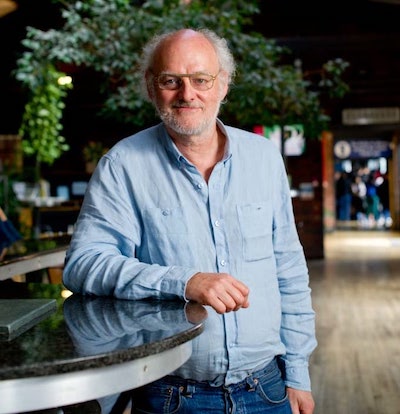
“There are opportunities on people’s doorstep. It is interesting how you need to create a sense of scale – larger scale, because Bristol is small compared with international centres – but also a sense of openness and visibility.”
He added: “It is becoming a place where there is so much going on – that is on the cultural front, on the social activism front, on the environmental front and, critically, on the tech front.”
Whereas Bristol’s proximity to London used to be a problem, it had gradually turned into an advantage as the city gained its own identity. It was true of other cities like Cardiff or Manchester, too, but “Bristol is slightly ahead of the curve,” Penny argued.
Penny met Destecroix while he was still running Watershed, where his job was to connect the city more. Although Destecroix was now a well-known person in Bristol, he had been making plenty of noise even before Ziylo’s acquisition, Penny recalled.
“It was obvious that Bristol had a very strong, high-value manufacturing centre, primarily aerospace, that had been embedded for a long time. We had a strong, growing chip design infrastructure. But both aerospace and chips were design, and the creative industries were design – and nearly all of those were white label.
“I had been trying to join up these pieces. Robotics is a key area where things have joined up, for example with Open Bionics. They make 3D-printed prosthetic limbs, and they also have deals with Disney and James Cameron. Are they a creative industries company? Are they a medtech company? Are they a robotics company?
“What we did not have in that mix was any serious biomedical companies, and obviously that is where the big money is. Then suddenly, there is Destecroix.”
Everyone was telling Destecroix to just go to the golden triangle, Penny remembered, but he wanted to do it in Bristol. Penny recognised Destecroix was doing for biosciences what the media had gone through over the past three decades, turning from an industry that felt like it needed a London base to one that was confident to have its headquarters in Bristol.
“What I like about Destecroix is his determination to do it here, to use his success, to help other people. Where else does that happen? The west coast of America. It is that sense that it is not just about my own discipline, we need people who understand big data, design, communication. Destecroix is bringing a massive new chunk to this ecosystem, which bit by bit is growing and gaining confidence. He is absolutely driven, I take my hat off to him.”
Prof Michele Barbour, associate pro vice-chancellor for enterprise and innovation at University of Bristol shared the enthusiasm for the city. “The Bristol innovation ecosystem is really exciting, fast-moving, fast-developing. There is still scope to develop further, but it is a key aspect of how we as a university interact with the city and the world more widely.
“From the university’s perspective, we have a lot of world-leading research and it is very much at the forefront of our interests to get that research out there into the wider world. What that means depends on what research it is. But the innovation ecosystem that surrounds us in the city and in the region is key to us realising both the impact of our research and our civic mission.”
She added: “Science Creates is a fantastic place. What they offer and how they deliver it is important for entrepreneurs and early-stage companies in the local area.”
That Science Creates had two distinct locations was “an illustration that there is no one-size-fits-all when it comes to a company that either is spinning out of a university or starting up,” Barbour noted. “There is a diversity of needs, both in terms of the space and facilities, but also where they need expertise, guidance, consultants or mentorship.”
She continued: “The formal events and training that they run are great, but it is also just bringing people together over a coffee or a sandwich and letting them speak about what excites them and what frustrates them about their early-stage companies and let that cross-pollination happen naturally. That is why incubator spaces like that are important.”
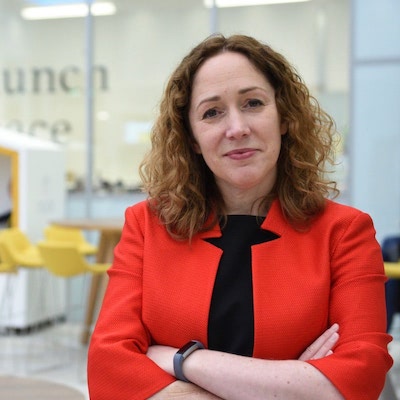
Although still new in her current job – she was promoted in February 2022 – Barbour is well-placed to understand the intricacies of the ecosystem, having launched her own spinout, Pertinax Pharma, in 2015. That experience had been “really exciting”, she celebrated.
“It was not in my game plan,” she admitted. “It was a chance research finding that led to a discovery of a technology which we felt could have applications in the wider world.” Eventually that research reached a stage where it was beyond the remits of a university and rather than take a backseat or license it to an existing company, Barbour was “too excited and too enthused about the technology and how we could move it forward to be willing to step away”.
She added: “I learnt an awful lot about how innovation is adopted and taken forward in a more commercial environment. I made a network of contacts that have become fantastic long-term contacts and, in many cases, friends. It really broadened my view as an academic and in my new role, what I would like to do is encourage other academics to take that path, but with insight and a realistic view of what is ahead.”
One of the key support systems that was still lacking in 2015 was space. “At that time, there was very little in the way of lab space for rent available. We were one of the first tenants of Future Space, an incubator based at University of the West of England. It was fantastic for us and it was really good timing, but they were the first to operate and they filled up rapidly.”
Nowadays, there were also more training programmes available, she added, and more of a recognition of the benefits of this type of company. “The culture in higher education is adapting to see that these activities are absolutely the right things for academics to be engaging with,” she reflected.
Destecroix noted that his passion for Bristol was because it was uniquely placed to pull it all off: “There are not many cities in UK where you can do this well, because you need to have enough of a research base, a big enough city and good connectivity to other cities. It has to be an attractive place for young people to want to live. Bristol has a lot of these things going for it.”
That the Temple Meads quarter was a 200 acre-site in the city centre was an important factor too, he argued, because it allowed scientists to work in Bristol – not in a research park so far out that it might as well be in a different city.
“These jobs should help invoke cultural change around how not only the researchers view translational research and entrepreneurship, but also how society views this type of business and and how differentiated it should be.
“Why should scientists not be rock stars? TechCrunch did that for IT – they were ridiculed, but they were transformative to how people view technology,” he said.
Those tech startups created a lot of angel investors, who were looking to support the next generation – a lot of whom were trying to solve deep technology problems. The pandemic helped shift the public perception of the importance of science.

There was already a perceptible impact, he declared. “I was speaking to the dean of life sciences at University of Bristol and they are seeing huge waves of people coming into biosciences as a result of the pandemic. People want to add to this effort of improving human health and fighting pandemics.”
Nowadays, you could easily imagine people saying, “you can code, that is so cool”, Destecroix pondered, “whereas 20 years ago nobody would have cared”. It was the same concept with deep tech, he argued. “We should celebrate these people and not hide our geekiness.”
He added: “Bristol is renowned for caring about everything. It is a great independent, free-thinking city that does a lot to promote issues. We are here to try and develop solutions from Bristol. We have had a fantastic reception from local government and from community. We had hugely supportive planning applications from the Old Market community, largely because of the outreach programmes that we have been renowned for as well – their school children have come through here.
“I have been in Bristol for 12 years and a lot of people here are Bristol through and through, so we want to give back to the city as well as, importantly, look out on a global scale from what we can solve.”
That global scale would also come from Science Creates Ventures, Destecroix noted. The two were separate, he stressed, with their own plans and teams.
Ventures was set up when Destecroix became an angel investor after selling Ziylo and noticed that the deep tech companies he was interested in had almost logarithmic capital requirements. These startups “very soon outgrow” their initial investors.
“The problem in Bristol was that too many cornerstone investments were by angels and that is dangerous because for these companies to ever be successful they need VC money.”
The difference between securing an angel investment and VC funding was stark, Destecroix observed. An angel investor only had to like the entrepreneur and their idea to take a punt, because all the decision-making, risk and responsibility fell on the investor themselves.
As an institutional investor, Science Creates Ventures needed to follow regulations set by the UK regulator, Financial Conduct Authority. There was a fund manager, Kin Capital Partners, an entire investment team, a due diligence process and investors that Ventures had to report to, he explained.
“The amount of people and complexity involved in making sure that I am not just giving you money because I like you is so much more stressful for you as the founder. But the benefits are that instead of convincing 20 people like me, you convince two or three of us and the money is there. Often what happens is those funds understand this sector and technology, and they have reserve capital to lead the next rounds.”
A previous lack of enough institutional money meant that companies never raised enough capital to scale properly or it took them several more years to achieve it. That, in turn, created the additional problem of “expertise suffocation” – experienced senior management was not interested in joining these companies, because they would rather work for a venture-backed company.
The aim for Science Creates Ventures was to “build a renowned venture capital firm on a national and international scale over the next decade”. The firm, while rooted in Bristol and expecting to make half of its investments in the city, had already been investing throughout the UK. “I think what Bristol has suffered from is it is too internal,” Destecroix remarked.
To date, Science Creates Ventures had invested in rounds together with long-established peers such as Parkwalk Advisors, Octopus Ventures and the British Growth Fund. Mercia, too, recently opened offices down the street from Science Creates, Destecroix noted.
“They took us for lunch, it was great,” he enthused, because it meant Science Creates was becoming an important part of the venture capital landscape not just in Bristol but in the UK. “Trust starts to build,” he added. “You get to know each other’s processes and respect the other partners.”
These were firms that received hundreds and hundreds of pitches but made only a few investments. “If they are putting their name to something, then there is usually something there,” he declared. “If you can bring on these investors early on and build that relationship with them, trust builds in the management team. It is one thing to have the technology, but will the team fall apart?”
It was not a nice experience as a founder to go through the pains of institutional investment, Destecroix acknowledged, but “it teaches you a lot and readies you to take on that larger investment because it only gets worse”.
Science Creates Ventures was hoping to get involved in those larger rounds in future, Destecroix revealed. Currently a seed investor, that would invest in pre-seed rounds on occasion, the idea for Fund 2 was to expand into series A rounds.
Destecroix had given up on angel investments and instead put money into Science Creates Ventures “under the same terms as the other investors”, he stressed. “Venture capital is where I want to spend a lot of my time now.”

He was fascinated with insights gained into how companies operated and watching young chief executives taking their businesses to new heights, he revealed. It was a privilege to be a part of that and then being able to use the knowledge to find more opportunities to improve people’s quality of life.
Destecroix also remains a director on Carbometrics, the business spun out from Ziylo following its acquisition that is working on glucose sensor chemistry to develop continuous glucose monitors. The company is led by chief executive Andy Chapman, who previously served as chief scientific officer at Ziylo. Notably, Chapman was not the only person who made that move: “the whole team was transferred to Carbometrics”, Destecroix remembered. “It was almost like everyone went to work the next day and we just changed our name.”
Barbour noted, too, that the venture capital scene in Bristol had exploded in recent years. “To quote some numbers, in 2020, we were looking at about £330m in the region, whereas it was £1.1bn last year. Investors cannot help but notice that trend and cannot help but want to lift the lid and see if there is something exciting there that they might like to get involved in.”
External reports corroborated these numbers, Barbour added. “We were ranked as the number seven city for spending last year by Beauhurst and the best for return on investment in a recent report by GovGrant.
“That does help to consolidate that profile and publicise to the world what we already feel, which is we are a great place to come to if you are interested in investing in spinouts and startups.”
The university had benefitted from its membership in SETsquared and personally, she had also had support, training and mentoring through their programmes, she added. SETsquared’s work included specific programmes aimed at increasing diversity and making sure people from diverse backgrounds were able to launch startups, she stressed. Here, too, the numbers were increasing – before SETsquared focused on this area, “the proportion of founders and C-suite members of the spinouts was about 4% or 5% women, about 4% or 5% black, Asian and minority ethnicity. Last year, it was 45% women, 24% black, Asian and minority ethnicity.”
Barbour cautioned: “That is not to say the job is done. There is more progress to be made in these areas, and SETsquared also have aims to look at the LGBTQ+ representation and try and make sure that they are doing everything they can, but those numbers are impressive. I hope that other groups trying to achieve those ends might learn from some of the work that SETsquared have done to actively grapple with those challenges.”
Barbour herself was involved with an Oxford Brookes University-initiated programme looking into the reasons why so few women researchers were creating spinouts – a project spearheaded by principal investigator Prof Simonetta Manfredi – and the Women on Boards initiative that aimed to bolster the number of female directors.
Science Creates’ backers also included Research England and Barbour welcomed the fact that the government was putting its money where its mouth was. “If the government means what it says about the science superpower, then that is going to require investment. That is what we are seeing and that direction of travel is really pleasing,” she noted.
“What we need to see is the initiatives that I genuinely think are coming, which is to bridge that gap between traditional academic research and industry. There is the startup economy and the spinout economy, which is an important part of that, but also things like the Catapults and allowing large companies to access the expertise within universities and incentivising academics to want to do that.”
It was important to note that the range of innovation coming out of University of Bristol, Barbour underlined, and to recognise that it was not all spinouts founded by people working at the university. Student enterprise also played a crucial role. Examples of the latter included haptic interface technology developer Ultraleap, originally founded by a PhD student which raised £60m in a series D round in November 2021, Barbour said, while female urinal developer Peequal was an example not only of a startup that had recently raised £250,000 but also of a company co-founded by two women, Amber Probyn and Hazel McShane, when they were still undergraduate students.
“We have put a lot of work into supporting student enterprise with a few different initiatives, some of which have been running for a number of years and have a really great track record, some of which are new,” she stressed. “We really do consider that student and graduate enterprise is a key part of this economy, they raised £7.5m last year.”
Rampuri contributed: “Our special sauce is our ability to convene and connect at the intersections of innovations. We innovate in where cyber meets creative or where biosciences meets fintech. There are some interesting intersections that can happen because of our small but beautiful scale. We get a lot of people from different sectors coming to the same events and so get a lot of crosstalk between them in a really positive sense.”
Rampuri’s experiences with government support had been mixed, he admitted. He managed to secure £35m for QTIC after weighing up conflicting recommendations from colleagues who told him either version of “do not ever ask the minister for money because they get really annoyed” and “make sure you have an ask ready and make sure it is really big”.
He recalled: “There was a ministerial roundtable held at Bristol and we presented to David Willetts, then the minister of state for universities and science, what we thought the potential for the UK was.”
The focus on quantum technologies was not happenstance. Rampuri, who started off in industry initially working on rocket motors at BAE Systems, noted that there had been seminal work done at the university whereby the first-ever demonstration of on-chip quantum CNOT gate was developed – “it is like the transistor for a quantum computer,” he explained.
To date, QTIC had supported around 35 quantum technology businesses, he noted. “They employ more than 220 staff, raised £60m to £70m and generated a huge amount of economic value.”
Bristol now did end-to-end quantum, from foundational mathematics through to startups developing products and services, he celebrated. Importantly, “all of that is within a square mile of the university.”
“Our job is to reach into the lab and help researchers become entrepreneurs. Most of the knowledge of these deep technologies sits in people’s heads. You have to support that journey of people – call it training or a fellowship, call it what you like, but it is about moving people from being in a lab to being in the market.”
Mustafa Rampuri
But a major hurdle Rampuri identified was the lack of a programme that would help get research out of labs into deep tech spinouts. That £35m for QTIC had come from the government’s Quantum Technologies Enterprise Centre, which was not refunded.
“Perhaps the misunderstanding in government is that there are one or two programmes that look very similar, but they are actually very different,” he pondered. “ICURe, for example, is good at helping people understand whether there is a market or not. What it does not help them do is construct a business around it, develop a product or a service, understand how they are going to get that funded, what their team is going to be, or what their governance and board structures are.
“You might say, there are a lot of accelerators that do that, for example the Seraphim Space Accelerator, which is a good programme. But they take incorporated businesses who largely have already received seed funding and are a couple of years out of the lab.
“Our job is to reach into the lab and help researchers become entrepreneurs. Most of the knowledge of these deep technologies sits in people’s heads. You have to support that journey of people – call it training or a fellowship, call it what you like, but it is about moving people from being in a lab to being in the market.”
At the moment, he argued, that journey was allowed to be passive. The UK, he declared, “cannot compete with the US in sheer money terms, but we can compete with them in other ways. The thing that Europeans are good at is what I call Alpine-style innovation, whereas Americans are good at motorway-style innovation.”
He elaborated: “Americans will build the motorway up the side of the mountain, but it needs a huge amount of resource. Brits and Europeans are a two-man team with a piece of rope and they get up there fast and they make it to the top first. The big problem with that is the result of ‘invented here, exploited elsewhere’.
“What you can do with these modest interventions is that you put in the fixed ropes – think of it as the equivalent of the Italian climbing technique called via ferrata, which consists of fixed metal ropes. Anybody can do the climb; you just clip onto a metal rope and it is there permanently. That is the opportunity.”
But those interventions just did not exist currently and it was a frustratingly hard thing to articulate, he lamented. “I have spoken to numerous people, including at UKRI and to science minister George Freeman, and they keep coming back to ‘has that market failure not been dealt with?’
“Actually, no, there is a whole market, which includes things like Seraphim and ICURe, but there is a specific failure right at the coalface that really needs to be addressed because that is where the bottleneck is.”
Universities were not equipped to deal with this on their own and, importantly, also typically did not think that way in the first place, he claimed. “Patent budgets and tech transfer teams are ludicrously small. We do not do tech scouting. We do not do entrepreneurs-in-residence unless they are part of some other programme. It is not in our DNA and that is fundamentally something that needs to change within the commercialisation landscape.”
It was not all doom and gloom, of course. Rampuri celebrated the existence of SETsquared and its approach of training founders the basics of running businesses to de-risk them for investors.
Ziylo went through the SETsquared programme, as did Ultraleap and hundreds of others, Rampuri noted. They were not necessarily tech startups either, he stressed, giving the example of Gapsquare, co-founded by Zara Nanu, which was working to close the gender pay gap.
“They spent quite a bit of time in SETsquared and quickly sold for about £8m, which is impressive given that it is almost a social enterprise.”
Such exits created people who could then give back to the ecosystem and that was key to Bristol’s future. “When I look at things like the Cambridge phenomenon, the takeaway is not that they have massive amounts of money but the general commitment to the phenomenon – David Cleevely, Hermann Hauser and the many others who have come after who are totally committed to supporting the next generation as they come through.
“It is that level of commitment that we want to build as part of our ecosystem.”
Engine Shed, which also fell within Rampuri’s remit, was “a great place to convene people and get them excited and sign up to becoming mentors, coaches and trainers”, he said.
“Destecroix is that next generation and he is totally bitten by the bug,” Rampuri added. “I am a director on his board as well, because the university is a co-investor in Unit DX, so I am obviously a fan and I think he does an amazing job. I am very supportive of the work that he is doing and I am always encouraging people to work with him and to do more with Science Creates, because it is fabulous for the region.”
The university had thrown its weight behind Science Creates because, much like there was a lack for the support of quantum technology startups, there was nothing to capture biosciences either.
“Innovators need somewhere to go. It was a collision of coincidences in a way that Ziylo was needing space outside of the university to scale up – there were many other companies that were getting toward that point in time – and it was a great shout for Destecroix to say, ‘we need to build an innovation centre’.”
Asked what his hope for Science Creates’ future was, Rampuri responded that he trusted Destecroix to spot an opportunity and make the most of it. “The best that we can do is get behind it and not get in the way,” he maintained.
Both Rampuri and Barbour predicted that more science-based incubators would emerge in the city, with Rampuri revealing the university had held discussions with interested parties particularly around the Temple Meads zone.
“Science Creates will probably have a relationship with those so that they can bed into the ecosystem quickly,” Rampuri predicted. Part of the trick was also continuing to make sure startups emerging out of SETsquared kept being de-risked enough to be a good bet for Science Creates Ventures and other firms.
The pandemic had helped create a favourable environment for venture funding, he observed, as investors were now much more comfortable hearing pitches over Zoom.
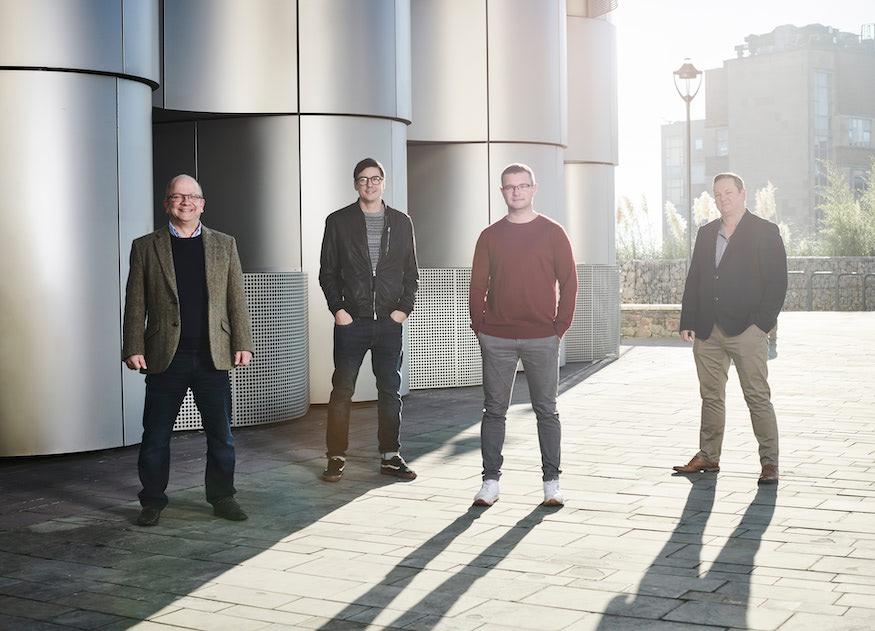
Looking to the future himself, Destecroix highlighted the importance of the team around him – many of whom he had been surrounded by for some eight years. Jokingly calling it his learning support team, he pointed to the need to balance getting a lot of work done without risking burnout.
“If I spend an hour with my team, they have two days’ worth of work. The only way that I can do well and we can achieve things is with this amazing team that does all of the work and helps buffer and deliver.”
“It is like organised chaos,” he concluded. “On the outside it might seem that I am here, there and everywhere, but actually it is all part of the plan. It has definitely not been plain sailing to get here, but as long as you are prepared that it is going to be difficult or require much of your attention then that is okay.”
Some might argue that something like Science Creates would have eventually been built in Bristol even without Destecroix and that the city was always travelling in this direction. There are certainly many people working towards this goal, but Destecroix’s contribution was undoubtedly crucial.
He might be filling incubators instead of stadiums but spend any time with Harry Destecroix and you will walk away thinking of him as the kind of rock star he wants all scientists to be.

Thierry Heles
Thierry Heles is editor-at-large of Global University Venturing and Global Corporate Venturing, and host of the Beyond the Breakthrough podcast.


